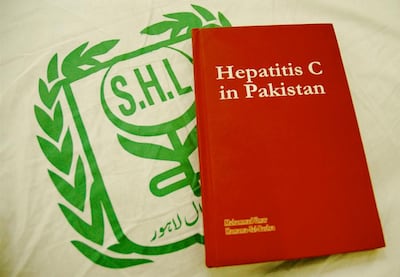Pakistan is the leading country for hepatitis infections, with between 10 million and 15 million people suffering from the disease, and experts warn The National that not enough is being done to stop the spread.
At an annual conference of the UN Group of Friends to Eliminate Hepatitis in New York last week, medical experts called on Pakistan to take urgent measures, ramp up testing and increase co-operation with international health organisations.
Pakistan has expressed the intent to eradicate the disease – known as “the silent killer” because it does not present symptoms for several months after initial infection in some cases – by 2030.
Saeed Akhtar, a medical expert living in the US who represented Pakistan at the UN conference, told The National that Pakistan currently has the world’s largest number of hepatitis patients.

“Approximately, there are 100 million hepatitis C patients in Pakistan, and the patients of hepatitis B and C number more than 150 million,” he said.
Dr Akhtar said that previously, Egypt was the country most affected by the disease, but its government has successfully tackled the threat, with the World Health Organisation saying hepatitis C had been virtually eliminated in the country.
He also mentioned that hepatitis treatments take three months and cost about Rs12,500 ($43).
“Its treatment is not expensive, but a major problem in Pakistan is a lack of awareness,” said Dr Akhtar, who also serves as chairman of the Pakistan Kidney and Liver Institute and Research Centre in Lahore city.
“We need to visit educational institutions and other places to raise awareness among people so that everyone undergoes screening for the disease.
“It is a silent killer. Someone may carry this disease, but they may not even be aware of it. This is why proper screening and testing are the keys to safeguarding oneself against the disease.”
Tariq Hayat, project director at the Hepatitis, HIV-Aids and Thalassemia Control Programme in Khyber Pakhtunkhwa, told The National that hepatitis prevalence is 5.3 per cent in the province.
“We are working on disease prevention with the support of the National Hepatitis Control Programme, under which we provide free examinations and medicine to patients,” he said.
He added that the government has now begun to respond to the threat of hepatitis.
A Blood Transfusion Authority has also been set up as part of efforts to prevent the spread of blood-related diseases, including hepatitis.
Hepatitis is a global public health concern with varying prevalence rates across different regions. Egypt and Pakistan are two countries that have faced significant challenges in combating hepatitis in recent years.
Before Pakistan, Egypt had the highest hepatitis C prevalence rates in the world, with an estimated 10 per cent to 15 per cent of its population infected.
The high prevalence was attributed to past healthcare practices, including the widespread use of contaminated needles and syringes.
An estimated 11.55 per cent of adults in Pakistan have been affected by a hepatitis C infection, according to a study published in the journal Tropical Medicine and Health, which states that roughly one in every 20 Pakistanis is infected with the disease.
The annual global mortality rates attributed to hepatitis B and C are alarming, with 563,000 and 366,000 deaths, respectively. The study said that international co-operation and continued public health initiatives were crucial to reducing the prevalence of hepatitis worldwide.

